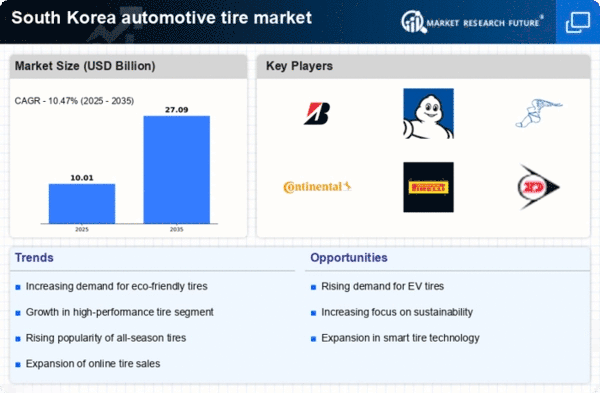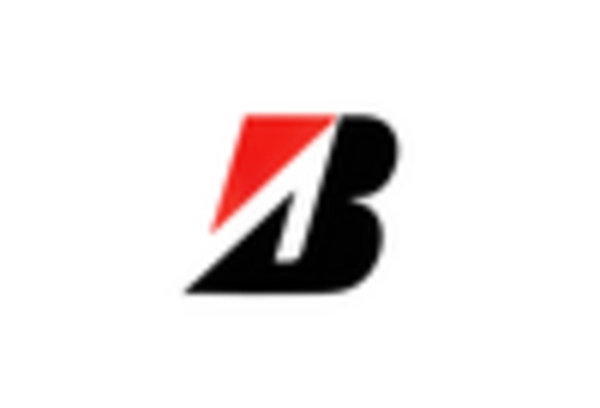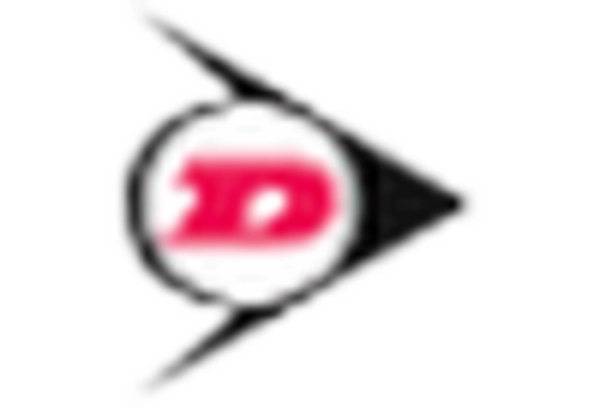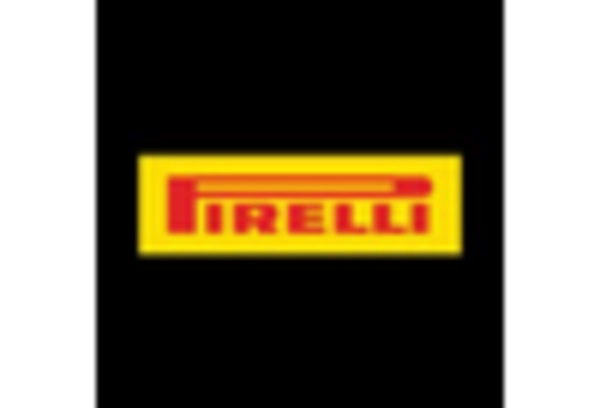Increasing Vehicle Production
The automotive tire market in South Korea is experiencing growth driven by the rising production of vehicles. In recent years, the country has seen a surge in both domestic and foreign automotive manufacturing, with production levels reaching approximately 4 million units annually. This increase in vehicle output directly correlates with a heightened demand for tires, as each vehicle requires a set of tires for operation. The automotive tire market is thus benefitting from this trend, as manufacturers strive to meet the growing needs of automakers. Furthermore, the South Korean government's initiatives to support the automotive sector, including tax incentives and infrastructure development, are likely to further bolster vehicle production, thereby enhancing the demand for tires in the market.
Shift Towards Electric Vehicles
The automotive tire market is witnessing a notable shift towards electric vehicles (EVs) in South Korea. As the government promotes eco-friendly transportation solutions, the adoption of EVs is expected to rise significantly. By 2025, it is projected that EV sales could account for over 20% of total vehicle sales in the country. This transition necessitates specialized tires designed for electric vehicles, which often require unique performance characteristics such as lower rolling resistance and enhanced durability. Consequently, the automotive tire market is adapting to these new requirements, leading to innovations in tire technology and design. Manufacturers are likely to invest in research and development to create tires that cater specifically to the needs of EVs, thus driving growth in the market.
Expansion of Tire Retail Networks
The automotive tire market is experiencing growth due to the expansion of tire retail networks across South Korea. With the increasing number of tire shops and service centers, consumers have greater access to a variety of tire options. This expansion is not only limited to physical stores but also includes online platforms, which are becoming increasingly popular among consumers. As of 2025, it is estimated that online tire sales could represent around 15% of total tire sales in the country. The automotive tire market is thus benefiting from this diversification in retail channels, as it allows for greater consumer choice and convenience. Retailers are likely to enhance their service offerings, including installation and maintenance, to attract more customers and drive sales.
Government Regulations on Tire Standards
Government regulations regarding tire standards are playing a crucial role in shaping the automotive tire market in South Korea. The Ministry of Land, Infrastructure and Transport has implemented stringent regulations aimed at improving tire safety and environmental performance. These regulations require manufacturers to adhere to specific performance criteria, which may include factors such as tread wear, fuel efficiency, and noise levels. Compliance with these standards is essential for manufacturers to remain competitive in the automotive tire market. As a result, companies are investing in advanced technologies and materials to meet these regulatory requirements, which could lead to innovations in tire design and performance. This regulatory environment is likely to drive growth in the market as manufacturers strive to produce high-quality, compliant products.
Rising Consumer Awareness of Tire Safety
Consumer awareness regarding tire safety is increasingly influencing the automotive tire market in South Korea. As more individuals recognize the importance of maintaining proper tire conditions for safety and performance, there is a growing demand for high-quality tires. Reports indicate that approximately 30% of vehicle accidents are attributed to tire-related issues, prompting consumers to prioritize tire maintenance and replacement. This heightened awareness is leading to an increase in tire inspections and purchases, thereby benefiting the automotive tire market. Retailers and manufacturers are responding by offering educational resources and promoting tire safety campaigns, which may further enhance consumer engagement and drive sales in the market.
















